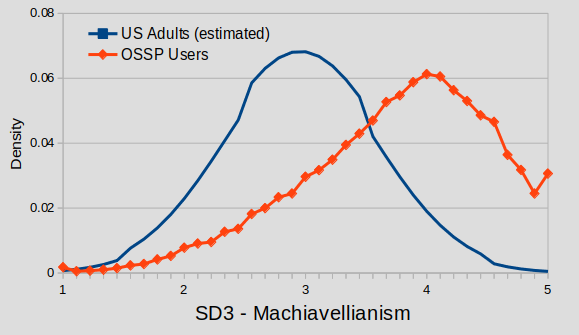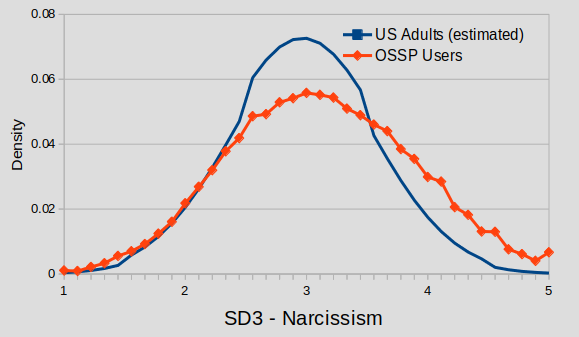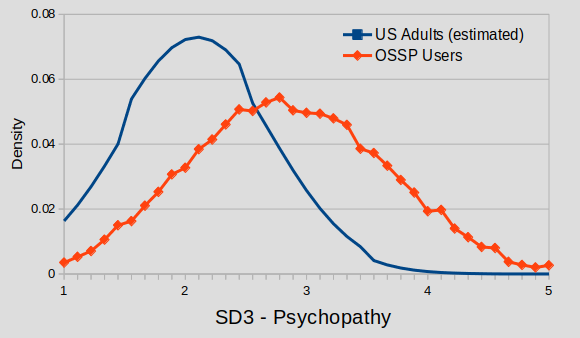The page reports results from the Short Dark Triad (SD3). Be careful about sharing them.
Score summary
Scores on each scale are reported here from 1 (low) to 5 (high). This is how scores were reported in the original article that introduced the SD3, but they are sometimes reported in other ways (e.g. 0-4, percent of maximum, etc.). To help interpret the scores, percentiles relative to other people who have used this website and US adults (estimated, see Note 1) are also provided.
(1)
(5)
users
adults
The box below shows the distribution of scores on the SD3. Use the tabs to switch between traits.

The estimated distribution for US adults is probably not very good because so far research has only been done with convience samples and the assumptions of the model are not fit particularly well (see Note 1). But it was important to try to offer a comparison other than to just the data from this website because you can see that people who have taken the SD3 on this website tend to score much higher on average than other samples. This is mostly because of the survey topic participation bias, a general phenomenon where respondents who have more of something are more interested in taking a survey about that thing.
Scale descriptions
Machiavellianism
Machiavellianism is the personality trait of being unprincipled and manipulative, cynical and an acceptance of "by whatever means necessary". It is name after the Italian Renaissance political philosopher Niccolò Machiavelli who argued that it was good for politicians to be deceitful because it made them more effective.
Narcissism
Narcissism is the personality trait of vanity, self-superiority, entitlement, dominance, and a craving admiration and submission. People high in narcissism believe that they deserve more than anybody else because they are better than everybody else. The trait is named after a character from Roman poetry who fell in love with his own reflection.
Psychopathy
Psychopathy is the personality trait of being low-empathy and high impulsivity. It is a persistent pattern of deviant behavior and a disregard for others. Psychopathy is the trait most closely connected to criminal behavior.
Notes
[Note 1]
There SD3 does not have a normative sample. It has been used in a lot of research, but only ever using convenience samples. So we have to statistically estimate a normative sample. The general idea is that a big set of convenience samples with as much diversity as possible averaged together may approximate a normative sample.
To collect the studies, a search was made on Google Scholar with the term "Short Dark Triad". Articles that reported mean and standard deviation for the 3 scales and had large sample sizes were indexed. Studies with similar samples to ones already collected were skipped (e.g. a large number of studies used mTurk, but only the two highest quality were chosen to be included here).
The summary statistics were commonly broken down by sex. Often the samples were not split evenly by sex, but because the general population is, calculations were done as if they were. Making the formulas for the combined means and standard deviations:
mean = (mean_m + mean_f)/2
SD = sqrt( ( sd_m^2 + sd_f^2 + 2 * ((mean_m - mean_f)/2)^2 ) / 2 )
If there were multiple samples in one article, a weighted average was taken before these formulas were used.
The table below contains the extracted values after aggregation and conversion to the 1-5 scale (if required).
| Citation | Sample | n | M | N | P |
|---|---|---|---|---|---|
| Jones, Daniel N., and Delroy L. Paulhus. "Introducing the short dark triad (SD3) a brief measure of dark personality traits." Assessment 21.1 (2014): 28-41. | mTurk users from USA and Canada | 998 | 3.2 (0.57) | 2.83 (0.52) | 2.16 (0.62) |
| Persson, Björn N., Petri J. Kajonius, and Danilo Garcia. "Revisiting the structure of the Short Dark Triad." Assessment 26.1 (2019): 3-16. | Residents of the US on mTurk | 1487 | 3.05 (0.62) | 2.76 (0.61) | 1.95 (0.50) |
| Baughman, Holly M., et al. "Relationships between bullying behaviours and the Dark Triad: A study with adults." Personality and Individual Differences 52.5 (2012): 571-575. | Adults recruited through snowball sampling starting with posters and emails at a Canadian university | 657 | 3.28 (0.59) | 2.97 (0.56) | 2.2 (0.64) |
| Papageorgiou, Kostas A., Ben Wong, and Peter J. Clough. "Beyond good and evil: Exploring the mediating role of mental toughness on the Dark Triad of personality traits." Personality and Individual Differences 119 (2017): 19-23. | Adults from "advertisements on social networks (e.g. Facebook) as well as through word of mouth" | 608 | 3.05 (0.68) | 2.92 (0.57) | 2.14 (0.58) |
| Jonason, Peter K., et al. "Dorian Gray without his portrait: Psychological, social, and physical health costs associated with the Dark Triad." Personality and Individual Differences 78 (2015): 5-13. | Undergraduates from a southwestern American university | 1389 | 2.99 (0.78) | 3.38 (0.73) | 2.16 (0.8) |
| Hmieleski, Keith M., and Daniel A. Lerner. "The dark triad and nascent entrepreneurship: An examination of unproductive versus productive entrepreneurial motives." Journal of Small Business Management 54 (2016): 7-32. | Business undergraduates and MBA students in the USA | 742 | 2.36 (0.867) | 3.29 (0.73) | 2.12 (0.77) |
| Egan, Vincent, Stephanie Chan, and Gillian W. Shorter. "The Dark Triad, happiness and subjective well-being." Personality and individual differences 67 (2014): 17-22. | Persons "via Facebook and a variety of online Internet-based research sites" | 861 | 2.8 (0.5) | 2.7 (0.6) | 2.0 (0.6) |
| Butler, Jonathan Craig. The dark triad, employee creativity, and employee performance in the new venture context. Diss. Oklahoma State University, 2015. | Small business owners contacted from a registry of business owners in US south | 159 | 2.34 (0.58) | 2.97 (0.31) | 1.86 (0.5) |
| Adler, Nancy. Who Posts Selfies and Why?: Personality, Attachment Style, and Mentalization as Predictors of Selfie Posting on Social Media. City University of New York, 2017. | CUNY undergraduates + social media recruitment | 499 | 3.05 (0.7) | 2.77 (0.59) | 2.15 (0.62) |
| Kay, Cameron S., and Gerard Saucier. "Insert a joke about lawyers: Evaluating preferences for the Dark Triad traits in six occupations." Personality and Individual Differences 159 (2020): 109863. | Undergraduates at a north-western US university | 463 | 2.9 (0.56) | 2.91 (0.53) | 2.16 (0.56) |
A weighted average of these samples produced the following norms.
| Scale | Mean | SD |
|---|---|---|
| SD3 - Machiavellianism | 2.96 | 0.65 |
| SD3 - Narcissism | 2.97 | 0.61 |
| SD3 - Psychopathy | 2.09 | 0.63 |

